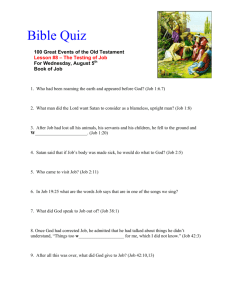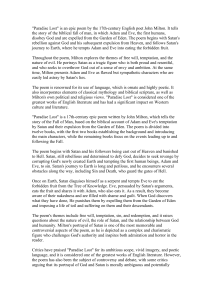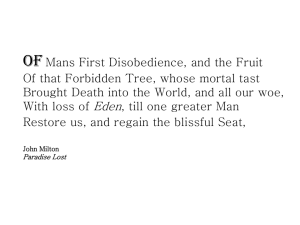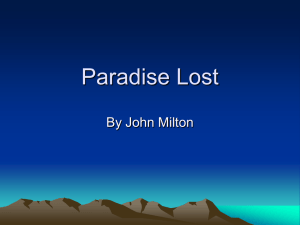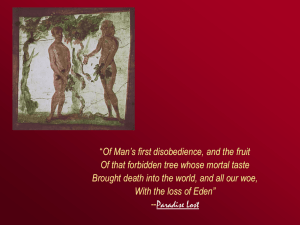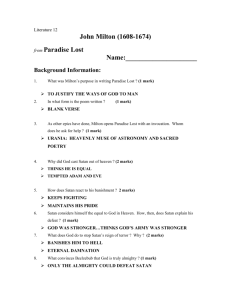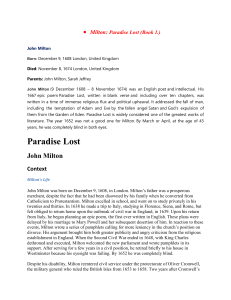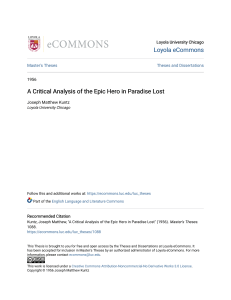Paradise Lost
advertisement
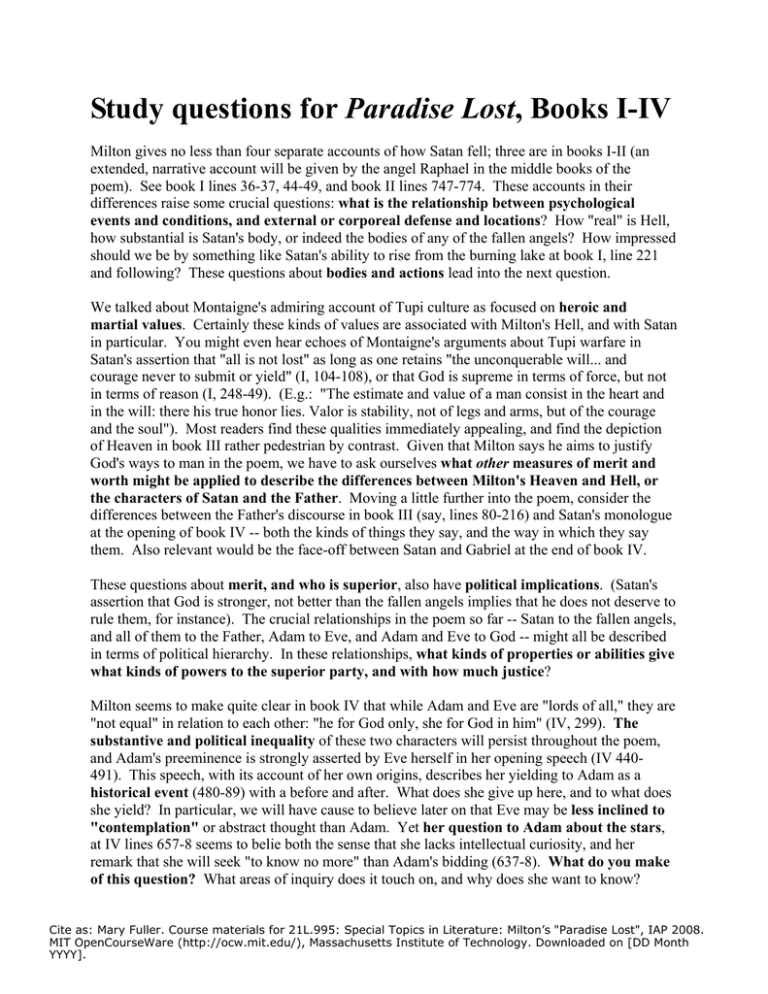
Study questions for Paradise Lost, Books I-IV Milton gives no less than four separate accounts of how Satan fell; three are in books I-II (an extended, narrative account will be given by the angel Raphael in the middle books of the poem). See book I lines 36-37, 44-49, and book II lines 747-774. These accounts in their differences raise some crucial questions: what is the relationship between psychological events and conditions, and external or corporeal defense and locations? How "real" is Hell, how substantial is Satan's body, or indeed the bodies of any of the fallen angels? How impressed should we be by something like Satan's ability to rise from the burning lake at book I, line 221 and following? These questions about bodies and actions lead into the next question. We talked about Montaigne's admiring account of Tupi culture as focused on heroic and martial values. Certainly these kinds of values are associated with Milton's Hell, and with Satan in particular. You might even hear echoes of Montaigne's arguments about Tupi warfare in Satan's assertion that "all is not lost" as long as one retains "the unconquerable will... and courage never to submit or yield" (I, 104-108), or that God is supreme in terms of force, but not in terms of reason (I, 248-49). (E.g.: "The estimate and value of a man consist in the heart and in the will: there his true honor lies. Valor is stability, not of legs and arms, but of the courage and the soul"). Most readers find these qualities immediately appealing, and find the depiction of Heaven in book III rather pedestrian by contrast. Given that Milton says he aims to justify God's ways to man in the poem, we have to ask ourselves what other measures of merit and worth might be applied to describe the differences between Milton's Heaven and Hell, or the characters of Satan and the Father. Moving a little further into the poem, consider the differences between the Father's discourse in book III (say, lines 80-216) and Satan's monologue at the opening of book IV -- both the kinds of things they say, and the way in which they say them. Also relevant would be the face-off between Satan and Gabriel at the end of book IV. These questions about merit, and who is superior, also have political implications. (Satan's assertion that God is stronger, not better than the fallen angels implies that he does not deserve to rule them, for instance). The crucial relationships in the poem so far -- Satan to the fallen angels, and all of them to the Father, Adam to Eve, and Adam and Eve to God -- might all be described in terms of political hierarchy. In these relationships, what kinds of properties or abilities give what kinds of powers to the superior party, and with how much justice? Milton seems to make quite clear in book IV that while Adam and Eve are "lords of all," they are "not equal" in relation to each other: "he for God only, she for God in him" (IV, 299). The substantive and political inequality of these two characters will persist throughout the poem, and Adam's preeminence is strongly asserted by Eve herself in her opening speech (IV 440491). This speech, with its account of her own origins, describes her yielding to Adam as a historical event (480-89) with a before and after. What does she give up here, and to what does she yield? In particular, we will have cause to believe later on that Eve may be less inclined to "contemplation" or abstract thought than Adam. Yet her question to Adam about the stars, at IV lines 657-8 seems to belie both the sense that she lacks intellectual curiosity, and her remark that she will seek "to know no more" than Adam's bidding (637-8). What do you make of this question? What areas of inquiry does it touch on, and why does she want to know? Cite as: Mary Fuller. Course materials for 21L.995: Special Topics in Literature: Milton’s "Paradise Lost", IAP 2008. MIT OpenCourseWare (http://ocw.mit.edu/), Massachusetts Institute of Technology. Downloaded on [DD Month YYYY].
